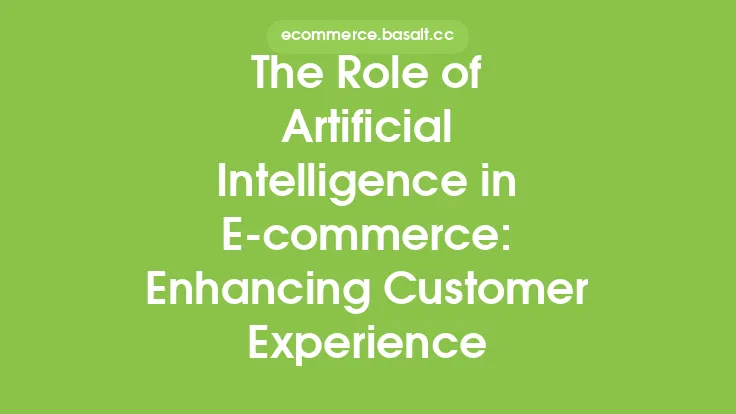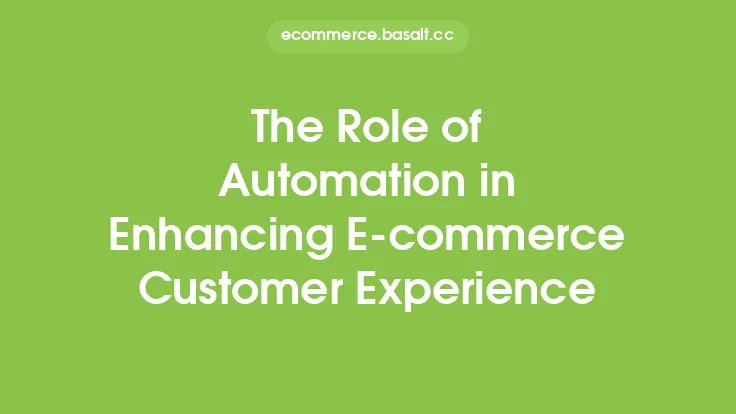The e-commerce industry has witnessed a significant transformation in recent years, with the integration of artificial intelligence (AI) being a key driver of this change. One area where AI has made a substantial impact is in customer service and support. The role of AI in e-commerce customer service and support is multifaceted, and its benefits are numerous. In this article, we will delve into the world of AI-powered customer service and explore its applications, advantages, and future prospects.
Introduction to AI-Powered Customer Service
AI-powered customer service refers to the use of artificial intelligence technologies, such as machine learning, natural language processing, and chatbots, to provide automated support to customers. This technology enables e-commerce businesses to offer 24/7 support, reduce response times, and improve the overall customer experience. AI-powered customer service can be delivered through various channels, including websites, mobile apps, social media, and messaging platforms.
Applications of AI in E-commerce Customer Service
AI has numerous applications in e-commerce customer service, including:
- Chatbots: AI-powered chatbots can be used to provide instant support to customers, answering frequently asked questions, and helping with simple queries.
- Virtual assistants: Virtual assistants, such as Amazon's Alexa and Google Assistant, can be used to provide voice-based support to customers.
- Sentiment analysis: AI-powered sentiment analysis can be used to analyze customer feedback and sentiment, enabling businesses to identify areas for improvement.
- Personalization: AI can be used to personalize the customer experience, offering tailored recommendations and support based on customer behavior and preferences.
Benefits of AI in E-commerce Customer Service
The benefits of AI in e-commerce customer service are numerous, including:
- Improved response times: AI-powered customer service can respond to customer queries instantly, reducing response times and improving the overall customer experience.
- Increased efficiency: AI can automate routine tasks, freeing up human customer support agents to focus on more complex issues.
- Enhanced personalization: AI can be used to personalize the customer experience, offering tailored recommendations and support based on customer behavior and preferences.
- Cost savings: AI-powered customer service can reduce the need for human customer support agents, resulting in cost savings for businesses.
Challenges and Limitations of AI in E-commerce Customer Service
While AI has the potential to revolutionize e-commerce customer service, there are also challenges and limitations to its adoption. These include:
- Lack of human touch: AI-powered customer service can lack the human touch and empathy that customers often require.
- Limited understanding: AI may not always understand the nuances of human language, leading to misunderstandings and miscommunications.
- Dependence on data quality: AI-powered customer service is only as good as the data it is trained on, and poor data quality can result in suboptimal performance.
Future of AI in E-commerce Customer Service
The future of AI in e-commerce customer service is exciting and promising. As AI technologies continue to evolve, we can expect to see even more sophisticated and personalized customer service experiences. Some potential future developments include:
- Increased use of machine learning: Machine learning algorithms can be used to improve the accuracy and effectiveness of AI-powered customer service.
- Integration with other technologies: AI-powered customer service may be integrated with other technologies, such as augmented reality and virtual reality, to create even more immersive and engaging customer experiences.
- Greater emphasis on human-AI collaboration: As AI becomes more prevalent in customer service, there may be a greater emphasis on human-AI collaboration, with humans and AI systems working together to provide the best possible support to customers.
Best Practices for Implementing AI in E-commerce Customer Service
To get the most out of AI in e-commerce customer service, businesses should follow best practices, including:
- Start small: Begin with a small pilot project to test the effectiveness of AI-powered customer service.
- Choose the right technology: Select an AI technology that is tailored to your business needs and goals.
- Train and test: Train and test your AI-powered customer service system to ensure it is functioning effectively and efficiently.
- Monitor and evaluate: Continuously monitor and evaluate the performance of your AI-powered customer service system, making adjustments as needed.
Conclusion
In conclusion, the role of AI in e-commerce customer service and support is significant, and its benefits are numerous. From improving response times and increasing efficiency to enhancing personalization and reducing costs, AI has the potential to revolutionize the way businesses interact with their customers. While there are challenges and limitations to its adoption, the future of AI in e-commerce customer service is exciting and promising. By following best practices and staying up-to-date with the latest developments, businesses can harness the power of AI to provide exceptional customer experiences and stay ahead of the competition.





